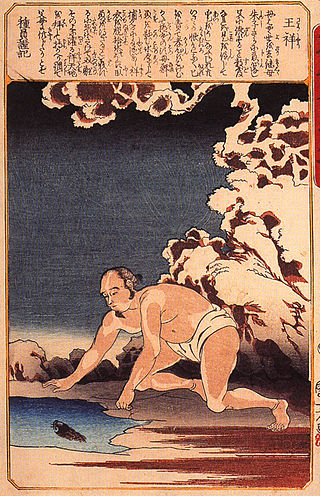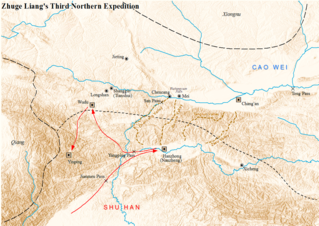Cao Mao, courtesy name Yanshi, was the fourth emperor of the state of Cao Wei during the Three Kingdoms period of China. He was a grandson of Cao Pi, the first emperor of Wei. Described as intelligent and studious, Cao Mao made repeated attempts to seize back state power from the regent Sima Zhao but failed. He was killed in an abortive coup d'état against Sima Zhao.
Cao Huan (245/246–302/303), courtesy name Jingming, was the fifth and last emperor of the state of Cao Wei during the Three Kingdoms period. On 4 February 266, he abdicated the throne in favour of Sima Yan, and brought an end to the Wei regime. After his abdication, Cao Huan was granted the title "Prince of Chenliu" and held it until his death, after which he was posthumously honoured as "Emperor Yuan ".

Zhuge Liang's Northern Expeditions were a series of five military campaigns launched by the state of Shu Han against the rival state of Cao Wei from 228 to 234 during the Three Kingdoms period in China. All five expeditions were led by Zhuge Liang, the Imperial Chancellor and regent of Shu. Although they proved unsuccessful and ended up as a stalemate, the expeditions have become some of the best known conflicts of the Three Kingdoms period and one of the few battles during it where each side fought against each other with hundreds of thousands of troops, as opposed to other battles where one side had a huge numerical advantage.
Cao Shuang, courtesy name Zhaobo, was a Chinese military general and regent of the state of Cao Wei during the Three Kingdoms period of China. He was the eldest son of Cao Zhen, a prominent general of Cao Wei. He initially held great power in Cao Wei as General-in-Chief but later lost his power to Sima Yi in the Incident at Gaoping Tombs and was executed on charges of treason.

Cao Zhen, courtesy name Zidan, was a military general of the state of Cao Wei during the Three Kingdoms period of China. He was an adopted son of Cao Cao, a warlord who rose to power in the late Eastern Han dynasty and laid the foundation for Wei. After Cao Cao's death and the end of the Eastern Han dynasty, Cao Zhen served under Cao Pi and Cao Rui, the first two emperors of Wei. He is best known for leading a successful defence of Wei from the first two of a series of invasions by Wei's rival state, Shu Han, between 228 and 229.
Empress Guo, personal name unknown, formally known as Empress Mingyuan, was an empress of the state of Cao Wei during the Three Kingdoms period of China. She was married to Cao Rui, the second ruler of Wei; she was his third wife and second empress. The limited information available about her appears to portray her as an intelligent woman who fought hard to prevent her empire from falling into the hands of the Sima clan during the reigns of her adopted son Cao Fang and his cousin Cao Mao, but was unable to stem the tide.
Guo Huai, courtesy name Boji, was a Chinese military general of the state of Cao Wei during the Three Kingdoms period of China. He started his career towards the end of the Eastern Han dynasty under the warlord Cao Cao as a subordinate of Cao Cao's generals Xiahou Yuan and Zhang He. During the Three Kingdoms period, he served in Wei, the state established by Cao Cao's son Cao Pi, and lived through the reigns of four Wei emperors. From the 220s until his death in 255, he governed and defended Wei's western borders in Yong and Liang provinces. During this time, he resisted multiple invasions by Wei's rival state, Shu Han, and quelled some rebellions by local Qiang, Di and other non-Han Chinese tribes.
Wang Su (195–256), courtesy name Ziyong, was an official and Confucian scholar of the state of Cao Wei during the Three Kingdoms period of China. He was a son of Wang Lang. When Guanqiu Jian started a rebellion in Shouchun, Wang Su advised Sima Shi to lower the rebels' morale by treating their families with respect. Following that, Wang Su entreated Cao Mao to allow Sima Zhao to succeed Sima Shi as regent of Wei.
Sima Wang (205–271), courtesy name Zichu, was an imperial prince and military general of the Jin dynasty of China. He previously served in the state of Cao Wei during the Three Kingdoms period.
Chen Tai, courtesy name Xuanbo, was a military general and official of the state of Cao Wei during the Three Kingdoms period of China. He was a son of Chen Qun and a maternal grandson of Xun Yu. Chen Tai was very knowledgeable in the art of war, and so led his men as if they were his own children. When the regent Sima Shi began abusing his power and the emperor Cao Mao died under very suspicious circumstances, Chen Tai expressed his deep loyalty to the Cao Wei state by donning mourning garments at Cao Mao's funeral.

Wang Xiang, courtesy name Xiuzheng, was a Chinese politician who lived through the late Eastern Han dynasty (25–220), the Three Kingdoms period (220–280), and the early Western Jin dynasty (266–316) of China. He served in the highest positions in the government, including Minister of Works (司空) and Grand Commandant (太尉) in the Cao Wei state during the Three Kingdoms period, and Grand Protector (太保) during the Western Jin dynasty. He was also one of The Twenty-four Filial Exemplars.
Wang Ye was a Chinese politician of the state of Cao Wei during the Three Kingdoms period of China. He served under the Jin dynasty (266–420) after the end of the Three Kingdoms period.
Qian Hong was an official of the Jin dynasty of China. He previously served in the state of Cao Wei during the Three Kingdoms period. His father, Qian Zhao (牽招), was a notable military general of the Cao Wei state.

Zhang Yi, courtesy name Bogong, was a Chinese military general and politician of the state of Shu Han during the Three Kingdoms period of China. Born in the late Eastern Han dynasty, Zhang Yi was a 10th-generation descendant of Zhang Liang. He started his career as a scribe under the warlord Liu Bei, who founded Shu later, and gradually rose to the positions of a county prefect and commandery administrator. In the early 230s, he served as an area commander tasked with maintaining the peace in Shu's southern commanderies. In 234, he led the Shu vanguard during the Battle of Wuzhang Plains against Shu's rival state Wei. From 238 to 259, Zhang Yi steadily rose through the ranks to become one of Shu's top generals. During this time, although he strongly opposed the Shu general Jiang Wei's aggressive stance towards Wei, he still accompanied Jiang Wei on his military campaigns against Wei. In 263, he surrendered to Wei forces along with the Shu emperor Liu Shan when Wei launched a large-scale invasion of Shu. In the following year, Zhang Yi was killed by mutineers during a rebellion by the Wei general Zhong Hui. Like Liao Hua and Zong Yu, Zhang was one of few officials who served the Shu-Han state throughout its entire existence.
Jiang Wei's Northern Expeditions refer to a series of eleven military campaigns launched by the state of Shu Han against its rival state, Cao Wei, between 240 and 262 CE during the Three Kingdoms period in China. The campaigns were led by Jiang Wei, a prominent Shu general. Unlike the previous Northern campaigns led by Zhuge Liang, which added Wudu and Yinping commanderies to Shu Han state territories, Jiang Wei's campaigns ended up being unpopular in both the military and civil circles in Shu. Also unlike Zhuge Liang's campaigns which often featured 60,000 to sometimes even 100,000 Shu Troops, Jiang Wei's were often much smaller rarely exceeding 30,000 even after the death of Fei Yi, where Jiang Wei assumed control of the military. The Zhuge Liang campaigns did suffer from logistical and supply issues for their large army. Zhuge's successor Jiang Wan, believed that it was the Hanzhong's mountainous terrain itself that were to blame for the campaigns failures and attempted to switch the route through the Han river. Fei Yi, who succeeded Jiang Wan, agreed, and never allowed any large campaigns to be launched by Hanzhong. Jiang Wei however overlooked these concerns and used Hanzhong as his home base as Zhuge Liang did.
The Battle of Didao, also known as the Battle of Taoxi, was fought between the states of Shu Han and Cao Wei in 255 during the Three Kingdoms period in China. The battle concluded with a Wei victory.
Sima Zhao's regicide of Cao Mao, also known as the Ganlu Incident, occurred on 2 June 260 in Luoyang, the capital of the state of Cao Wei, during the Three Kingdoms period. Cao Mao, the nominal emperor of Wei, attempted to oust the regent Sima Zhao, who effectively controlled the Wei government. However, the plot concluded with Cao Mao's death and Sima Zhao retaining his status. Contrary to its intention, the coup actually increased the Sima clan's power and influence in Wei, thus providing a foundation for the eventual usurpation of the Wei throne in 266 by Sima Zhao's son Sima Yan, who founded the Western Jin dynasty.

The Battle of Jianwei was fought between the contending states of Shu Han and Cao Wei in the Three Kingdoms period of China. The battle was also the third of a series of military campaigns against Wei launched by Shu's chancellor, Zhuge Liang. The battle concluded with a Shu victory and the capture of Wudu and Yinping commanderies, which were located near present-day Longnan, Gansu.
Wang Guan, courtesy name Weitai, was a Chinese politician of the state of Cao Wei during the Three Kingdoms period of China. An orphan who made a name for himself as an honest local official, he would become a partisan of the Sima family as they overtook the Cao family and reached the highest ranks, though he retired after regicide.
Wang Chen, courtesy name Chudao, was a Chinese historian, military general, and politician of the state of Cao Wei during the Three Kingdoms period of China. After the Wei regime ended in February 266, he continued serving in the government of the Jin dynasty. He wrote a five-volume text known as the Wang Chudao Collection (王處道集) or Wang Chen Collection (王沈集), which is already lost over the course of history. He also wrote 14 chapters of the Quan Jin Wen (全晉文).





